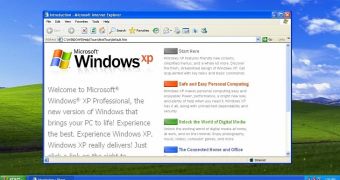Microsoft today rolled out an emergency patch for Internet Explorer that addresses a flaw which was detected on all versions of Windows out there, including Windows XP, which wasn't supposed to receive any other patches and security updates after April 8.
The company still issued a patch for Windows XP as well and although it promised to leave this operating system version fully vulnerable after it reaches end of support, Microsoft can't simply let the millions of users still running it vulnerable to attacks.
In a post this morning, Redmond doesn't provide too many details on this, but says that patching Windows XP was a priority. Of course, the company used this opportunity to remind users that moving to a newer OS version should be made as soon as possible.
“We have made the decision to issue a security update for Windows XP users. Windows XP is no longer supported by Microsoft, and we continue to encourage customers to migrate to a modern operating system, such as Windows 7 or 8.1. Additionally, customers are encouraged to upgrade to the latest version of Internet Explorer, IE 11,” Dustin Childs, group manager, Response Communications, Microsoft Trustworthy Computing, says.
At the same time, Redmond explains that it takes Windows security seriously, so that's why the company actually wanted to patch Windows XP and not let the platform vulnerable to attacks.
“The security of our products is something we take incredibly seriously. When we saw the first reports about this vulnerability we decided to fix it, fix it fast, and fix it for all our customers,” mentions Adrienne Hall, general manager, Microsoft Trustworthy Computing.
The problem is that by patching Windows XP, Microsoft might actually show those still running this particular OS version that they could delay the upgrade to a newer platform because the company would patch every single critical vulnerability that it finds.
According to the latest set of statistics, Windows XP is still installed on nearly 26 percent of the desktop PCs worldwide, so Microsoft's decision to patch thisit is actually fairly important for millions of users who haven't yet upgraded to a different operating system.
Of course, staying on Windows XP isn't quite the best thing right now because Microsoft might at one point really abandon the platform and refuse to fix flaws affecting it. The next Patch Tuesday takes place on May 13, so it remains to be seen whether Microsoft releases any other patches for Windows XP or gives up on it completely.

 14 DAY TRIAL //
14 DAY TRIAL //